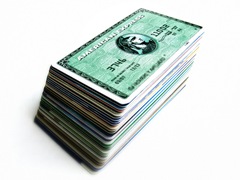Imagine that you are in financial distress. You have a mortgage, a car loan, and credit cards, but cannot pay all three. Which gets paid and which gets stiffed?
Obviously, this is a lesser of evils situation, not an ideal one. Not paying any one of them will have negative consequences. Defaulting on the credit cards will likely result in not being able to use them to buy more stuff. And the other two loans are secured, so not paying those bills could result in the loss of your wheels or roof over your head.
two loans are secured, so not paying those bills could result in the loss of your wheels or roof over your head.
You might think that since shelter is so important, the mortgage would be the most likely bill to be paid. And since buying more stuff on the credit cards is less vital to a person in financial trouble, you might assume that credit cards would be the most likely to be defaulted on. Having your cards taken from you would suck, but not as much as having your car taken.
Not so. Last week Wallet Pop ran a post by Lita Epstein that looked at default data for these three types of loan. Credit cards do turn out to be more commonly defaulted on than car loans, but not by as much as you might have assumed. 1.1% of credit cards were 90 days delinquent in the third quarter. 0.81% of car loans were 60 days delinquent.
Read more »
Free Money Finance had a "Help A Reader" post the other day with an email from a woman asking if folks thought it was a good idea to take money out of her mutual funds to pay off $24K in credit card debt.
The broad consensus from commenters on the post was yes, cash out the mutual funds and pay off the cards,  provided those funds are not inside an IRA or something similar. Okay, fine.
provided those funds are not inside an IRA or something similar. Okay, fine.
A few commenters obliquely approached the core craziness here by asking if the reader would have borrowed money on her credit cards to invest in the mutual funds. Of course that sounds like a really loopy idea, and of course that is what she (effectively) did.
Not paying off a credit card or other high-interest consumer debt so you can save or invest is, or at least should be, an intuitively bad move. The returns on the investments are unlikely even to approach the cost of borrowing the money.
Read more »
Continuing my review of the year via a review of this blog that I started yesterday, today the topic is the interrelated themes of credit cards and identity theft.
It has been quite a year for credit cards. How bad, and just how flat out weird, things had gotten was made apparent back in February, when I posted about American Express paying a bounty of $300 to certain customers to just go  away and stop being customers. As I said at the time, this can’t possibly make big-picture business sense, although it might have been a plausible reaction to some perverse incentives from Wall Street.
away and stop being customers. As I said at the time, this can’t possibly make big-picture business sense, although it might have been a plausible reaction to some perverse incentives from Wall Street.
Sadly, my scheme to seek out other companies that might pay me not to do business with them failed miserably.
By June things had gotten even worse for credit card companies. Or maybe the mainstream media just discovered how bad it was and started reporting on it. The Times had a story about how card companies had done everything but start printing "or best offer" after your balance on the monthly bill. I had a post on that, which also pointed out that everybody hated the companies anyway.
Read more »
Saturday night before last, Suze Orman issued yet another directive to her followers about credit cards. Readers may recall that back in March Suze told  us that we should make only the minimum payments on our cards until we had an emergency fund equal to eight months’ expenses built up. That inspired one of my many unsuccessful business ideas.
us that we should make only the minimum payments on our cards until we had an emergency fund equal to eight months’ expenses built up. That inspired one of my many unsuccessful business ideas.
Well, March was a long time ago. Stock and house prices are up, the recession has ended, and it even looks like the unemployment rate has crested. So I guess it is time for Suze to change strategies once again. This time the idea is to drop the cards. "Let’s go back to the times when you literally paid cash for everything. That’s right. Cash. Stop using your credit cards altogether.”
I don’t watch Orman’s show. I found out about this from a post at SmartSpending, as well as a post at Get Rich Slowly. That post, written by our friend Baker from ManvsDebt, has the virtue of an embedded video of Orman challenging us to spend only in cash. You can even sign up to join her Back to Cash Movement.
Read more »
Investing was actually my second career. For the six years between college and B-school I wrote software. Back then, we Dilberts had a phrase we used to parody the marketing types who sold what we made. "It’s not a bug, it’s a  feature!" In other words, that obvious flaw in the software is not, in fact, a mistake that makes it less useful, it is a brilliant design decision that actually makes it better and worth more to you, the customer.
feature!" In other words, that obvious flaw in the software is not, in fact, a mistake that makes it less useful, it is a brilliant design decision that actually makes it better and worth more to you, the customer.
I also, at this time, had an American Express card, paying, I think, $50 or $75 a year for the privilege. I honestly forget why. I think I got it while still in college under some kind of special deal. And there was this store I frequented that in those days only took Amex. Anyway, by the time I was 25 I came to my senses and cancelled the thing. They sent me a nice letter saying that if I ever came back I could still have a card that said "Member Since 1986".
So I’ve got that going for me.
I was reminded of both these things from my past by a brilliant new marketing campaign from American Express. For those of you not familiar with such things, let me explain that the conventional Amex card is not a credit card but a charge card. That is, they do not provide credit for longer than it takes them to send you a bill. You are expected to pay the full balance every month.
Read more »
 two loans are secured, so not paying those bills could result in the loss of your wheels or roof over your head.
two loans are secured, so not paying those bills could result in the loss of your wheels or roof over your head.


